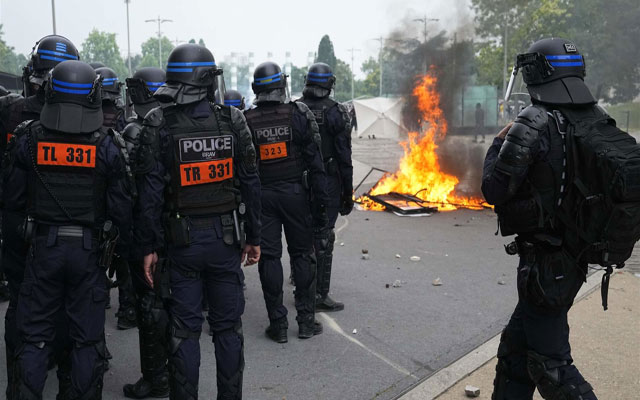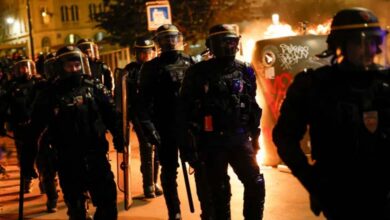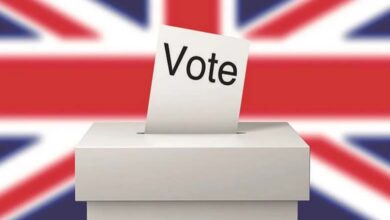Riots Reopen Old Wounds… French Police Performance Under Scrutiny

The killing of a young man by a police officer has raised long-standing questions about the state of the French police and the successive governments’ inability to reform this institution.
In a country that frequently experiences waves of disturbances that often lead to calls for suppressing rioters, it may be difficult to criticize a police force under pressure and losing some of its members.
However, experts say that authorities can no longer turn a blind eye to accusations from human rights groups regarding the prevalence of racism within the police force, racial profiling, recruitment and training issues, and the police’s ideology.
Historian Cédric Mas wrote on Twitter, “The constant thing is the political forces’ refusal to address one of the factors in this explosive mix, which is the police.”
He continued, “Riots in the United States and Britain in the 1960s and 1980s led to profound reforms within police departments. In France? Nothing has happened over the past forty years.”
Several Western governments, such as Britain in 2011 and the United States with the Black Lives Matter movement in 2013, have recognized the need to address racially motivated riots against the police in the past decades. However, France has long refused to acknowledge that racism plays a role in these riots.
Government official Allovi Can said in an interview with Reuters, “While France has introduced about 30 legislations on legal and regulatory aspects in the past two decades, none of them included any reform of the police force since the 1995 reform, which granted police unions extensive joint management powers.”
He explained that “since that moment, unions have been involved in everything that can be jointly managed, including human resources management. The tangible result in subsequent years has been agreements between unions and several interior ministers.”
These extensive powers include loyalty of police officers on the ground, tying their career advancement to the union they join, giving union leaders tremendous influence over government ministers.
Can added, “The main concern is the loss of control over the police force.”
Protest
French government ministers who attempted to reform the police and grant more independence to the Police Oversight Authority (IGPN) did so at their own responsibility.
In June 2020, former Interior Minister Christophe Castaner prepared plans to reform the police. This included banning chokeholds during arrest operations, reforming the Police Oversight Authority, and implementing a zero-tolerance policy towards racism within the institution.
After protests from police unions, a decision was made to appoint Gérald Darmanin as the new Interior Minister, in a ministerial reshuffle a month later.
Franck Louvrier, who served as communications advisor to former President Nicolas Sarkozy when he was Interior Minister, said, “Either you support the police or you face problems.”
He added, “The Ministry of the Interior is based on human factors and your feelings towards them, because police officers are attacked every day.”
Darmanin’s proposal to reform the police’s investigation branch sparked anger within the police force this year, leading to several strikes at a difficult time for the government as protests against its retirement age plans erupted.
Racism
At the heart of the riots shaking the racially mixed working-class suburbs surrounding French cities, human rights groups have long accused the police of systematic racism.
The United Nations Human Rights Office expressed concern about the situation in France on Friday and urged the government to address racial discrimination.
Spokesperson Ravina Shamdasani said, “This is an opportunity for the country to seriously address the deep-rooted issues of racism and racial discrimination in law enforcement.”
Police unions and the Interior Minister argue that there are only isolated cases of racism and deny that it is systemic or widespread.
Anthony Caïd of the police union CGT told Reuters, “Yes, there are racists, and no one denies that… but systematically, I don’t know what that means.”
As France does not officially deal with skin color and restricts the use of ethnic statistics, it is difficult to obtain data supporting the grievances of racial minorities regarding being targeted by the police and facing discrimination.
However, there is ample consistent evidence from accounts.
In an important ruling, the Paris Court of Appeals stated in 2021 that discrimination was behind the police checks on the identities of three high school students, who are French citizens of Moroccan, Malian, and Comorian descent, while they were at a train station in Paris in 2017.
The court decided to award each of them compensation of €1,500, in addition to legal fees.
However, such fines are rare, and human rights groups argue that police officers often face only minor penalties, fueling a sense of impunity.
Police Accountability
Sociologist Sébastian Roch, editor-in-chief of the journal “Policing and Society,” said, “What we see is that it is difficult for judges to make decisions to imprison police officers. This is not unique to France, as there are difficulties in convicting and punishing police officers in the United States and northern countries as well.”
After the crisis of the “Yellow Vest” protests in 2018-2019, which witnessed violent protests and police crackdowns for months, criticisms of police doctrine and plans resurfaced.
The increase in deadly police shootings in recent years has been linked to the 2017 law reform, which expands the circumstances in which a police officer can use their firearm.
The law came into effect following a terrorist attack carried out by Islamist extremists in Nice in 2016. The law allows police officers to open fire if they believe it is “likely” that the driver will cause harm to people. Critics argue that this provision is a gray area.
Kyle, from the left-wing branch of the police union CGT, said, “It is not clear at all and allows for greater freedom when using firearms.”
He added, “The 2017 law must be repealed.”












